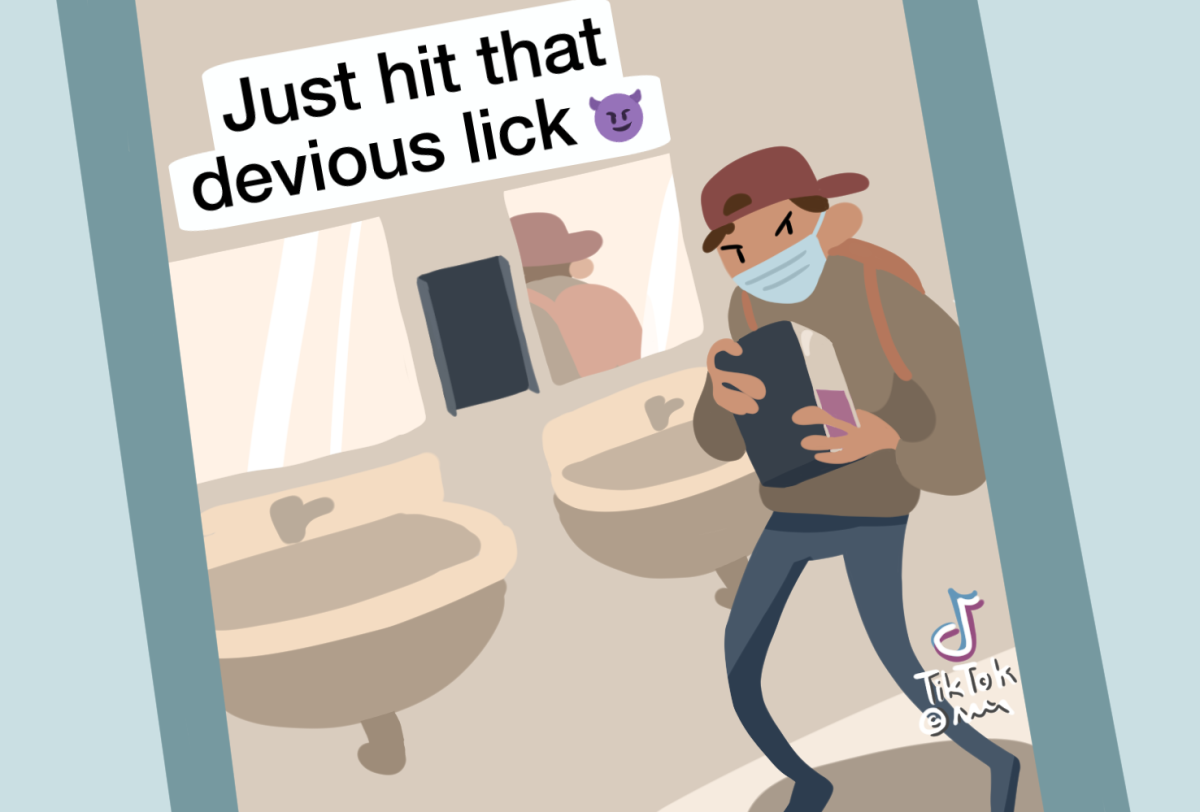Internet users can gain a large following by producing media that highlights a specific skill set. From woodworking tutorials or food reviews to relaxing whispers, every online niche contains a community of social media content creators who cater to supportive fans.
While many digital content creators have a unique skill that followers understandably admire and value, thousands of talentless “wannabe” influencers need to stop going to embarrassing, unhealthy and dangerous lengths to achieve internet fame.
One of the most recent clout chasing trends is called “devious licks” on TikTok. The trend includes students stealing various school supplies and resources, most commonly from a bathroom, for a comedic effect.
A “lick” is defined as a theft that results in an impressive and rewarding payday for the thief, according to Urban Dictionary.
Some people participating in devious licks have stolen items including soap dispensers, urinals and complete bathroom stalls, according to a Sept. 18 CNN article.
The trend creates financial burdens for schools with limited budgets, while promoting vandalism to receive validation from TikTok’s community.
Although this trend is recent, people have been desperately seeking attention on the internet for years.
YouTuber and social media personality Logan Paul was famously condemned in 2017 after posting a video including the body of an apparent suicide victim in Japan’s Aokigahara forest, according to a Jan. 11, 2018 BBC article.
Paul later posted an apology for his actions, according to the same article.
While an apology was appropriate, Paul’s preteen fanbase may still see his irresponsibility as a blueprint for gaining views and subscribers online, according to a Feb. 1, 2018 Mashable article.
Mashable is an international media platform covering entertainment, culture, science and technology, according to its website.
Children and teenagers are often victims of these trends, giving in to pressure from peers and popular social media influencers, according to a Sept. 25, 2020 American Academy of Pediatrics article.
Youths are more impulsive because their prefrontal cortex, the part of the brain that controls rational thought, isn’t fully developed until their mid-20’s, according to the American Academy of Pediatrics article.
The lack of brain development encourages kids to seek inclusion in trends that reward outrageous behavior without considering possible consequences.
In April 2020, 12-year-old Joshua Haileyesus from Colorado was found dead in his bathroom after attempting the “Blackout challenge” on TikTok, according to an April 27, 2020 USA Today article.
The Blackout challenge urged participants to choke themselves until they became unconscious, according to the USA Today article.
Without influencers promoting these types of challenges, unnecessary deaths could be avoided.
Although kids are more susceptible to engaging in harmful social trends, adults are not immune to the addiction that internet attention creates.
A Maryland couple lost custody of two out of their five children in 2017 after posting videos of “pranks” on their younger children, according to a May 4, 2017 NBC News article.
Mike and Heather Martin, formerly known as “DaddyOFive” and “MommyOFive” on YouTube, uploaded hundreds of videos of them yelling curse words at their younger kids, encouraging violence between them and blaming them for fabricated messes around the house, all under the guise of pranks, according to a Sept. 11, 2017 Baltimore Sun article.
How could any parent expect their child to trust them in that kind of environment?
Heather Martin, the kids’ step mother, claimed the videos were made for “shock value,” according to an April 28, 2017 ABC News article.
The couple was sentenced to five years probation on charges of child neglect after the two youngest children experienced “substantial impairments of their mental or psychological ability to function,” according to the Baltimore Sun article.
Their YouTube channel was also deleted.
Is a glimpse of internet fame worth the well-being of those around you, especially your kids?
For some people, a chance for an epic selfie is worth their life.
A 2018 study from the U.S. National Library of Medicine found that 259 people died while taking selfies between 2011 and 2017.
From cliffs to building roofs, deaths occured in a variety of places as people attempted to get the perfect shot, according to the same study.
Although participating in ridiculous activities may attract views and likes temporarily, possessing a genuine skill or talent is a more successful way to retain an audience.
Many influencers are famous for no identifiable reason.
Media consumers like myself have more appreciation for someone who exemplifies dedication and hard work than someone willing to endure the embarrassing consequences of shocking behavior for a taste of fame.









































